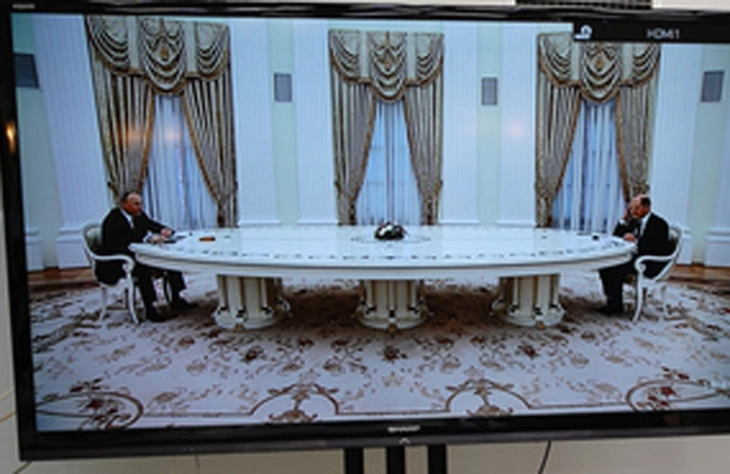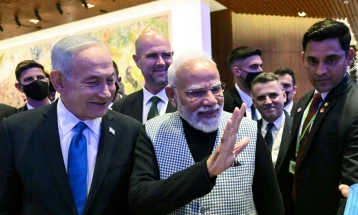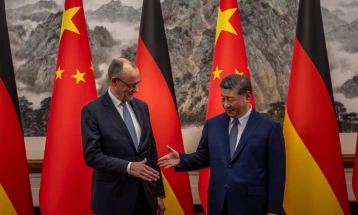German leader says diplomacy 'not exhausted' at meeting with Putin

Moscow, 15 February 2022 (dpa/MIA) - German and Russian leaders stressed their openness towards the diplomatic de-escalation of the Ukraine crisis on Tuesday, as Western officials cautiously welcomed Moscow's claims of a partial troop withdrawal from near the Ukrainian border.
German Chancellor Olaf Scholz said during his first official visit to Moscow on Tuesday that the diplomatic possibilities were "certainly not exhausted" when it came to resolving the crisis.
"We are ready, together with all partners and allies in the EU and NATO and with Russia to discuss very concrete steps to improve security for both sides," he said at a press conference with Russian President Vladimir Putin after face-to-face talks in the Kremlin.
Putin, for this part, said he was willing for continue talks with NATO and the United States over Russian requests for security guarantees that NATO would not expand its military alliance further east.
"Regarding the question of whether we want [war in Europe] or not: of course not!" said the longtime Russian leader in response to a query from a reporter.
Russian announcements of a partial troop withdrawal from near the Ukrainian border were a "good sign," Scholz said, adding his hope that further such steps would follow.
Russia's Defence Ministry announced earlier on Tuesday that it had begun withdrawing troops deployed in the south and west of the country, near Ukraine's border, back to their permanent bases, although it did not give an exact number.
Foreign Minister Sergei Lavrov underlined the message the troop movement was not a result of outside pressure, saying that the manoeuvres would be "implemented and concluded as planned," according to state news agency TASS.
It is not clear yet what is changing on the ground after the Russian announcement.
Ukrainian Foreign Minister Dmytro Kuleba commented: "We will only believe that there has been a de-escalation when we see troops moving out."
NATO Secretary General Jens Stoltenberg said the Russian announcements were "grounds for cautious optimism, but so far we have not seen any sign of de-escalation on the ground." French and German officials also gave the news a cautious welcome.
The troop deployments have caused tensions between the West and Russia to soar to levels not seen since the Cold War. Moscow has said its soldiers were only taking part in legal military exercises on its territory.
But the show of force has stoked fears in the West - which counts over 100,000 Russian troops near Ukraine's border - that Russia is preparing an attack, an allegation the Kremlin has denied.
Russia is also currently holding joint military exercises with Belarus and large-scale naval manoeuvres in the Black Sea, off the annexed Crimean Peninsula.
NATO meanwhile has been bolstering its military presence along its eastern border, including the addition of several thousand US troops. Norway said on Tuesday it was sending 50 to 60 troops to Lithuania.
Against this military backdrop, the Tuesday meeting was a chance for Scholz to prove his negotiating clout when faced with the long-serving Russian leader, who knows Germany well and speaks German after serving for several years as a KGB intelligence officer in former East Germany.
The two leaders were separated in their discussions by a roughly 6-metre-long, white oval table.
Enhanced social distancing was required after Scholz opted for a German coronavirus test, rather than a Russian one, the Kremlin had explained.
French President Emmanuel Macron had similarly refused a Russian coronavirus test and was sat at the same table during his Moscow visit.
At the start of the talks, Scholz praised what he described as "very orderly business ties" between the two countries.
One of the most sensitive issues for Germany and Russia is the Nord Stream 2 pipeline under Baltic Sea.
Long seen outside Germany as a controversial project, designed to bring Russian gas directly into Europe, Berlin has been repeatedly pushed by allies including the United States to say it will shut Nord Stream down in the event of a Russian invasion of Ukraine.
Putin pushed back on Tuesday and called for the Nord Stream 2 pipeline to begin operating.
It secures the energy security of Europe, Putin argued, asking rhetorically during the press conference whether consumers in Germany would be prepared to pay many times more for their gas if the pipeline is not allowed to open.
Scholz followed his previous strategy of remaining vague when addressing the pipeline question: "We all understand what's going on" when it comes to the Nord Stream 2 gas pipeline, he said.
"We want to guarantee peaceful development in Europe," Scholz said. If this is not the case, there would be "broad consequences."
Scholz's visit to Moscow - his first since taking office in December - is the latest top-level meeting on the crisis.
British Prime Minister Boris Johnson and US President Joe Biden spoke on Monday. According to Downing Street, they agreed that "crucial window for diplomacy" remains open.
There have also been NATO talks with Russia and direct Russia-Ukraine talks mediated by Germany and France, as well as offers of talks involving the Organization for Security and Co-operation in Europe (OSCE).







